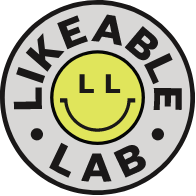Writer’s block. It looks kinda like this…
Scroll….
Keep scrolling….
Yep, that’s right. Writer’s block is when you have a blank screen (or piece of paper) in front of you and you can’t find the words to fill it with.
And, you might not know this, but it happens to everyone. Even seasoned writers.
Here at Likeable we have some pretty talented writers, but just because we’re good at it, and we do it a lot, doesn’t mean it always comes easily to us.
It’s a bit like running. You can be in peak condition but then, for no apparent reason, you have an ‘off day’. And it hurts.
Well, sometimes writing ‘hurts’. Why?
Psychologists believe the biggest reason behind writer’s block is fear. Fear of failure. Fear of putting yourself out there. Fear of being judged or criticised.
Perfectionism, self-criticism and pressure also have a part to play.
So what can you do about it? Different things work for different people, but if you’re stuck, try starting our ‘Top 10 Tips’ below.
1. Step AWAY from your computer
Staring at a blank screen won’t make words magically appear. By physically removing yourself, you instantly reduce the pressure you’re putting on yourself. How much of a break you take will depend on how much time you have on your hands – but even a quick walk around the block can help you refocus.
2. Exercise
Exercising reduces stress, focuses the mind, increases productivity and enhances memory. Research suggests it can also improve creativity and problem solving skills. Starting the day with some form of exercise will set you up for success (even if you’re having a bad running day).
3. Try freewriting
write down anything that pops into your head abandon punctuation let your imagination run wild set a timer for 5 minutes and don’t stop until it goes off let go of the need to make sense the purpose of freewriting is to unlock your ideas and get you into the flow you might be surprised by what appears on the page
4. Shift your creative focus
Creativity comes in many forms. Painting, drawing, sewing, knitting, cooking, sculpting… chances are if you’re a writer you have other creative outlets too. Whatever your thing is, take a break from writing and do it. This keeps you in the creative zone, and once you’ve painted that picture, you can start painting some words.
5. Switch things up
Do you consider yourself a morning person or a night owl? Turns out you could be doing it all wrong. A University of Michigan study suggests many people have ‘counterintuitive’ circadian rhythms – they are more productive at the times when they think they are the least productive. Makes no sense? Give it a go – try writing at what you think is your ‘least productive’ time of day and see what happens.
6. Distraction, not procrastination
Procrastinators have the cleanest houses right? The best way to avoid doing something is to do something else. And if you are getting your chores done at the same time it’s a win-win. Unless you only have a couple of hours to complete an essay or an important report. Do the dishes, make your bed or fold the washing to refresh and refocus, but don’t spring clean the whole house.
7. Minimise distractions
Speaking of distractions, there’s so much ‘noise’ in our lives these days. If you have a large piece of writing that needs doing, give yourself a distraction-free space in which to do it. Switch off notifications on your phone and, if possible, don’t look at your emails until you’re done. Ask those around you – family or co-workers – not to interrupt you. Noise cancelling headphones can work really well if you’re someone who’s easily distracted.
8. Chunk it
There’s nothing worse than looking at a blank screen or page and knowing you have to fill it… and many more besides. You can’t predict when writer’s block will strike, but you can plan your workload, or creative project, into bite-sized chunks of writing. Set yourself a daily goal and do your best to meet it. If you’re feeling particularly stuck, take the day off, but don’t leave it too long before you take to the keyboard again. 5000 words is infinitely harder to pull together in an afternoon than 500.
9. Do nothing
Sometimes doing nothing is the answer. Let your mind wander – you never know where it might lead you. In today’s busy world we are programmed to do, do, do. But NOT doing can unleash inspiration. Research shows that daydreaming can boost both creativity and problem solving.
10. Don’t be so hard on yourself
Your first draft is just that – your FIRST draft. Allow yourself to write copy that is less than perfect. Bad even. Because you’ve got to start somewhere. And once you start getting the words down, then you can start moulding and shaping them into something more polished. Amazing even.
Phew! After 5 mini-breaks, a walk around the block, the odd sugary treat… and a good dose of procrastination, we declare this blog written!
Need some help with your next writing project? Get in touch. (We promise not to charge for housework, long runs and tea breaks.)

